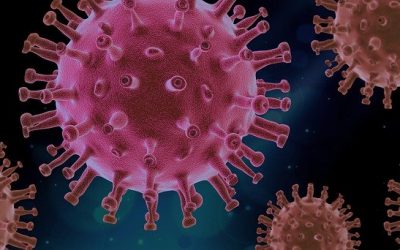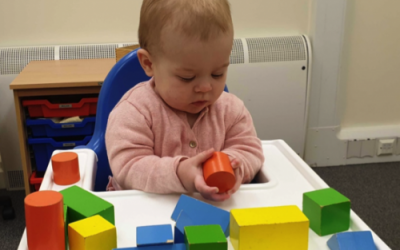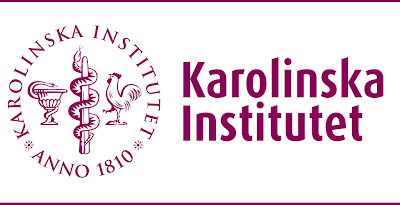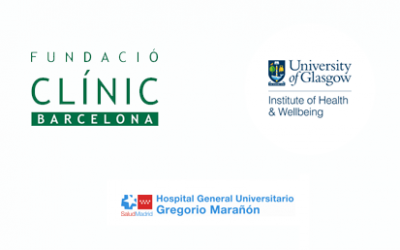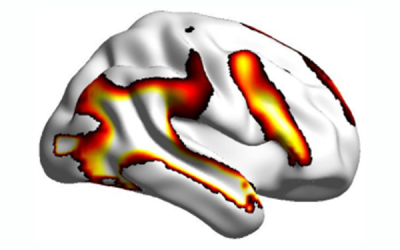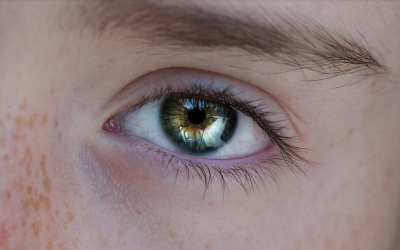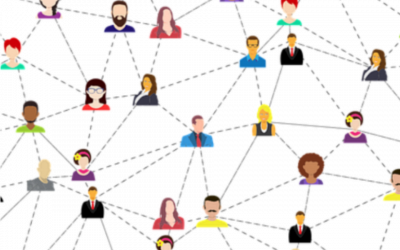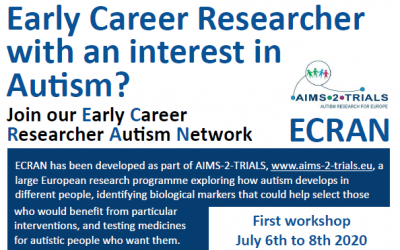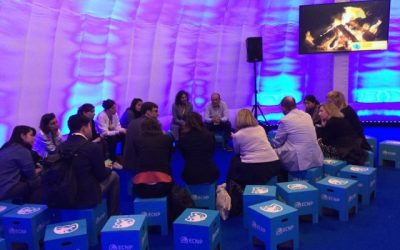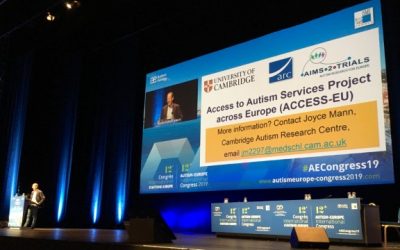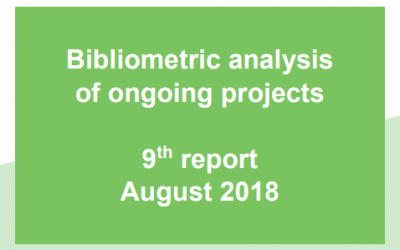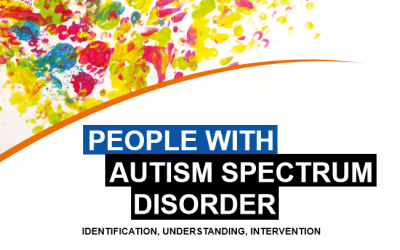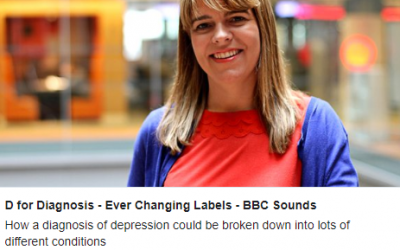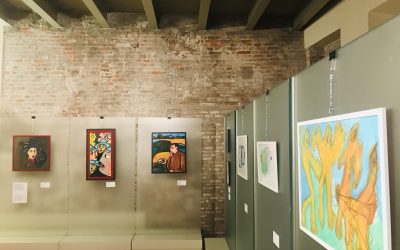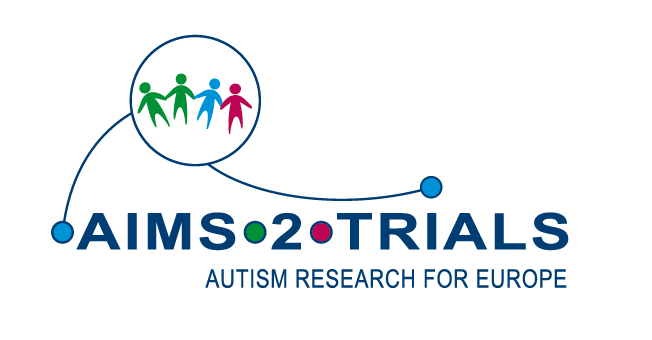AIMS-2-TRIALS Newsletter #1
July 2020Welcome to the first AIMS-2-TRIALS newsletter, introducing you to the largest ever European autism research programme and the work completed to date, over the last two years. Our researchers are exploring the biology of autism to allow future treatments to be tailored to individual needs. The programme also aims to develop new medicines and influence EU policy to better support autistic people.
Like many of you, our AIMS-2-TRIALS colleagues and their projects have been significantly affected by the Covid-19 crisis. Some, including members of the Autism Representatives group, were redeployed to work on the front line, while others have been asked to shift their research focus to the Covid-19 effort. Fantastic work is being done on a global Covid-19 database by the team at Institut Pasteur, and a team headed by our colleagues at Kings College London is launching a study to understand whether Covid-19 during pregnancy affects brain development.

“Our thoughts are with all those affected by the virus and we are extremely grateful for all the hard work and commitment of our colleagues during this difficult time.” Prof Declan Murphy
Keep up to date between newsletters via www.aims-2-trials.eu
Want to receive this newsletter by email? Subscribe here.
Research News
COVID-19 and AIMS-2-TRIALS
The COVID-19 pandemic will affect the running of many of our research projects during the next few months but AIMS-2-TRIALS will continue to work towards its existing goals, perhaps with a minor extension to its final end date. Many universities have been closed and/or have requested staff to work from home. In-person research participation at some, if not all, research sites has been temporarily suspended, meaning that progress on those research projects will be slower than expected. Researchers are working on ways to address these delays once the lockdowns have been lifted. AIMS-2-TRIALS consortium member Prof Celso Arango has written a very moving account of his experiences on the frontline in Madrid. He highlights how hospitals have been transformed as only the worst affected are...
Autistic people have quicker and shorter eye movements than non-autistic people
Autistic people have quicker and shorter eye movements and a narrower area of focus than non-autistic people, according to a new study by AIMS-2-TRIALS partners from Goethe University in Frankfurt. Previous research has shown that autistic people tend to look less at social aspects of their environment, such as human faces and biological movement, than people who are not autistic. It has been proposed that differences in this ‘visual exploration’ may occur because autistic people are less motivated by social information. However, evidence to support this theory of social motivation is inconsistent.AIMS-2-TRIALS researchers proposed that differences in visual exploration might be influenced by mechanisms controlling eye movement, rather than solely by how motivated people are to pay...
Elevated likelihood of autism and ADHD influences infants’ motor development
Ten-month old infants at an elevated likelihood of being diagnosed with autism or ADHD reach across their body less than those who are not, shows new research led by AIMS-2-TRIALS partners at the Birkbeck Baby Lab in London. Previous research has shown that general motor skills differ between infants with an elevated likelihood of autism or ADHD diagnosis and those with typical likelihood. The present study aimed to take this further, by investigating whether a specific type of motor skill – ‘midline crossing movements’ – follows this same pattern. Midline crossing movements describe, for example, using the left hand to pick up an object situated on the right side of the body.Autism has a strong genetic component and is known to be heritable within families; infants considered to be in...
Twin-study shows neurological problems are associated with autism
AIMS-2-TRIALS researcher Sven Bölte and PhD student Pei-Yin Pan are part of a team using a new approach to explore the relationship between autism and physical health. Autistic people are known to be at particular risk for physical health issues such as digestive symptoms, neurological conditions and problems with immune system regulation. Exploring the relationships between autism and these other conditions may provide insights into how autism develops. Understanding the mechanisms behind co-occurring physical health problems in autistic people could also be a first step towards addressing them and improving autistic people’s quality of life. However, to date, these mechanisms remain unclear. One way to investigate them is by working with monozygotic twins – those who share identical...
Clinical trials begin at three AIMS-2-TRIALS sites
Development of medicines is a key priority within the AIMS-2-TRIALS research programme and this will be achieved primarily via two clinical trials. A clinical trial is a specific type of research study that evaluates an intervention; in this case a medicine. The main goal of a clinical trial is to make sure that the intervention is safe and effective; that it is achieving the desired results with minimal and fewer harmful side effects than the current standard interventions. Clinical trials consist of several phases to test for safety, effectiveness and to understand whether the intervention works for the whole population or just a sub-group. The first clinical trial in AIMS-2-TRIALS is testing a medicine called arbaclofen, with the goal of improving social functioning in daily life for...
Understanding adaptive functioning in autism
Adaptive functioning refers to the ability to manage the demands of day-to-day life. It can include areas such as self-care, travel, shopping, cooking, fine motor skills and communication. It is understood that autistic people may learn some of these skills at a slower rate than their non-autistic peers. An AIMS-2-TRIALS study recently explored which factors contribute to this delay. This research demonstrated for the first time that reduced adaptive functioning is linked to the core social communication difficulties that define autism, rather than typical sensory symptoms, repetitive behaviours or any associated psychiatric symptoms. Tillmann, J., San José Cáceres, A., Chatham, C., Crawley, D., Holt, R., Oakley, B., Banaschewski, T., Baron-Cohen, S., Bölte, S., Buitelaar, J., … and and...
Autistic people’s social brain activity is not reduced
An article in Molecular Autism by AIMS-2-TRIALS researchers reports that – contrary to predictions made by previous research – in an analysis of one of the largest data sets of its kind, no group differences were found in the brain activity of autistic and non-autistic people while processing social information. The researchers aimed to scientifically test suggestions from existing studies that autistic people have reduced brain responses to social information. A type of brain imaging called fMRI (functional magnetic resonance imaging) was used across 6 European sites to compare brain activity between autistic and non-autistic people while they watched social video clips. The fact that no group differences were found could be partially due to differences in experimental methods between...
Autism and the right to education in the EU
Two recent AIMS-2-TRIALS publications demonstrate how International and European policies have successfully supported children's rights to equal education in six European countries. The ‘Universal Declaration of Human Rights’ and the ‘Convention on the Rights of Persons with Disabilities’ state that children with disabilities have the right to inclusive, quality and free education. These policies have resulted in Special Educational Needs services and support being offered in all schools in the Netherlands, Belgium, Germany, Denmark, Sweden and Finland. Van Kessel, R., Walsh, S., Ruigrok, A.N., Holt, R., Yliherva, A., Kärnä, E., Moilanen, I., Hjörne, E., Johansson, S.T., Schendel, D. and Pedersen, L., Jørgensen, M., Brayne, C., Baron-Cohen, S., and Roman Urrestarazu, A. (2019). Autism...
Clinical Trials Network
One of AIMS-2-TRIALS' key goals is to build, develop and utilise a network for research scientists to reduce barriers to running clinical trials in autism. The Clinical Trials Network, which began as part of the EU-AIMS project, has expanded to 118 sites across 37 countries to create a unique European network of centers highly qualified in the diagnosis, treatment and support of autistic people and their families. Together with autism advocate organisations, partners from academia, healthcare and scientific associations, a collaborative project team has been established, to drive the development of on-going and future activities and projects.
Changing pupil size indicates social abilities in autism
The amount that autistic people’s pupils widen (dilate) when watching others interact and the speed at which this happens is linked with their understanding of social behaviour, shows a study led by AIMS-2-TRIALS researchers. The study is the first to record the details of how pupil size changes during a test of social understanding. Previous research has focussed primarily on averages of pupil dilation measures, or investigated only a single aspect, such as time taken to dilate or amount of dilation. In the current study, participants watched videos of social interactions while researchers tracked their pupil size, including the timing and sequence of changes. 23 autistic and 24 non-autistic adolescents watched the videos and then answered questions about the characters’ mental states....
Click here for a full list of AIMS-2-TRIALS publications
Community News
Want to get involved?
If you are interested in participating in a research study, you can sign up to our mailing list here.
We will also publish details about studies that are recruiting via our participant recruitment page.
Autism Representatives (A-Reps)
The A-Reps are a group of autistic people, parents and carers from across Europe who have agreed to bring their perspectives on being autistic or caring for an autistic loved one to the AIMS-2-TRIALS research programme. They are coordinated by a team at the University of Cambridge and were recruited in early 2019 from nearly 100 European applications. Recruitment attempted to account for a range of strengths, needs and difficulties of autistic people, factors such as gender, age, intellectual ability, nationality, life experience and interests. Selection was made with the support of the A-Reps Steering Committee, a small group of interested people invited by Autistica to help with the running of A-Reps throughout the project. A-Reps’ involvement so far: To date, as well as providing...
Researcher training opportunities
The Early Career Researcher Autism Network (ECRAN) hosted their first workshop in July 2020. The workshop brought together 25 postdocs, 10 PhD students and 6 members of the autism community who are researchers themselves or who have a research interest in autism from 12 different European countries. Overall, it was a great success, with high levels of engagement and interaction throughout the event and fantastic feedback from all attendees. The aim of the ECRAN workshop was to bring together and provide training for the next generation of early career researchers (ECRs) with an interest in autism research. Workshop attendees were offered a multi-faceted three-day programme which included presentations on biomarker research, opportunities for collaborative project development and...
AIMS-2-TRIALS researchers at key events in Europe
Autism Europe Congress Consortium members participated throughout the Autism Europe Congress 2019 on 13th - 15th September, delivering keynotes, moderating sessions and as part of the scientific committee. James Cusack (Autistica) chaired a keynote session on empowerment of autistic people in an inclusive society. Simon Baron-Cohen (University of Cambridge) presented a keynote session summarising research on sex differences in autism and introduced the AIMS-2-TRIALS ACCESS-EU study on understanding access to services across the EU. Sven Bölte (Karolinska Institute, Sweden) presented 'From Diagnosis to Functioning and Quality of Life In Autism'. #AECongress19 European College of Neuropsychopharmacology Congress Over 5200 people attended the 32rd European College for...
Awards & More
Participants wanted for online survey about services across Europe
Researchers are recruiting autistic people and family carers for a survey in a project called ACCESS-EU. The project is exploring experiences of accessing services across Europe and beyond. Researchers are inviting autistic people who are over 16 years old, or parents and family carers of an autistic person of any age who have accessed or attempted to access a service post-diagnosis. Visit the policy research page of the AIMS-2-TRIALS website to find out more and complete the online survey. The survey asks questions about experiences with services received in the past two years. It takes 10-30 minutes to complete. Findings from the study will be used to shape a policy brief document addressing the need to improve service availability and accessibility for autistic people across Europe.
Prestigious scientific awards for consortium members
AIMS-2-TRIALS is celebrating prestigious awards received by two consortium members, both based at Kings College London. Oscar Marín, Director of the Centre for Developmental Neurobiology, was unanimously selected by an international jury to receive the Remedios Caro Almela Award for outstanding scientific research in Developmental Neurobiology. The prize was presented at the Spanish National Research Council (CSIC) in Valencia, Spain. Professor Marín has also now been elected to the prestigious Academy of Medical Sciences Fellowship. Charlotte Pretzch, Postdoctoral researcher at the Institute of Psychiatry, Psychology and Neuroscience (IoPPN) at Kings College London received the IoPPN Academic Psychiatry Emerging Career Researcher Prize of the Year 2019. Many congratulations to...
EU-AIMS published more research than any other project in its funding call
Congratulations to EU-AIMS, precursor to AIMS-2-TRIALS, which published more research than any other project in the Innovative Medicine Initiatives Joint Undertaking project call 3, with 255 papers by the end of 2017. This finding was reported in an IMI report – a ‘bibliometric analysis’ – which summarises the scientific output of its research projects. The report also found that EU-AIMS publications had more than twice the world average ‘citation impact’, a measure of how often the research has been referred to in other research papers. This is used as an indicator of research quality and suggests that the scientific quality of EU-AIMS research was exceptional. As the IMI supports and promotes collaborations between different sectors, such as academia, industry and charities, the report...
A new publication for Autism-Europe
Autism-Europe is an international autism association whose main objectives are to improve public awareness of autism and to advance the rights of autistic people and their families. In September, the third edition of their publication “People with Autism Spectrum Disorder. Identification, Understanding, Intervention” was published. This document provides an overview of current evidence-based knowledge and practice around autism. With the publication, AIMS-2-TRIALS partner Autism-Europe aimed to share a summary of current evidence-based knowledge about autism with a wide audience, to improve general understanding and impact positively on practice and policy in Europe. The purpose of this publication is to enhance awareness and understanding of autism and related practices, by making...
Declan Murphy & Gráinne McAlonan of KCL on BBC Radio 4
Declan Murphy and Gráinne McAlonan of Kings College London were recently featured on BBC Radio 4's 'D for Diagnosis' with Claudia Hammond, discussing the diagnosis of autism and co-occurring conditions. https://twitter.com/Aims2Trials/status/1158370309495578625
Other events
The 'What's Next in Autism Genomics' conference took place in February 2019 at Trinity College, Dublin. This was a free event, available to the public for anyone with an interest in autism to attend. Speakers included AIMS-2-TRIALS researchers, who outlined the latest advancements in Autism Research, with a specific focus on genomics. All talks from the day are available online. On Friday 13 Dember 2019, the art exhibition "L'arte risveglia l'anima” – “Art awakens the soul” – opened in Pisa, Italy. The art exhibition was first showcased in Florence in 2017 and reopened in Pisa with additional works by the artist Filippo Zoli. Dr Eugenia Conti, who helped organise the exhibition, explained that this exhibition is a way to promote awareness, understanding and inclusivity of autism and the...
Subscribers will receive AIMS-2-TRIALS newsletters approximately once per year.
Our website use Google Analytics, a web analytics service provided by Google, Inc. (“Google”). For full details please read our Privacy Policy and Imprint & Disclaimer.
Please note that MailChimp uses click-tracking technology and may use your personal information according to its Terms and Conditions. Find out more at the MailChimp Privacy Policy.
AIMS-2-TRIALS Newsletter #1
July 2020Research News
Community News
Awards & More
Welcome to the first AIMS-2-TRIALS newsletter, introducing you to the largest ever European autism research programme and the work completed to date, over the last two years. Our researchers are exploring the biology of autism to allow future treatments to be tailored to individual needs. The programme also aims to develop new medicines and influence EU policy to better support autistic people.
Like many of you, our AIMS-2-TRIALS colleagues and their projects have been significantly affected by the Covid-19 crisis. Some, including members of the Autism Representatives group, were redeployed to work on the front line, while others have been asked to shift their research focus to the Covid-19 effort. Fantastic work is being done on a global Covid-19 database by the team at Institut Pasteur, and a team headed by our colleagues at Kings College London is launching a study to understand whether Covid-19 during pregnancy affects brain development.

“Our thoughts are with all those affected by the virus and we are extremely grateful for all the hard work and commitment of our colleagues during this difficult time.” Prof Declan Murphy
Keep up to date between newsletters via www.aims-2-trials.eu
Want to receive this newsletter by email? Subscribe here.
Click here for a full list of AIMS-2-TRIALS publications
Back to top
Research News
COVID-19 and AIMS-2-TRIALS
The COVID-19 pandemic will affect the running of many of our research projects during the next few months but AIMS-2-TRIALS will continue to work towards its existing goals, perhaps with a minor extension to its final end date. Many universities have been closed and/or have requested staff to work from home. In-person research participation at some, if not all, research sites has been temporarily suspended, meaning that progress on those research projects will be...
Autistic people have quicker and shorter eye movements than non-autistic people
Autistic people have quicker and shorter eye movements and a narrower area of focus than non-autistic people, according to a new study by AIMS-2-TRIALS partners from Goethe University in Frankfurt. Previous research has shown that autistic people tend to look less at social aspects of their environment, such as human faces and biological movement, than people who are not autistic. It has been proposed that differences in this ‘visual exploration’ may occur because...
Elevated likelihood of autism and ADHD influences infants’ motor development
Ten-month old infants at an elevated likelihood of being diagnosed with autism or ADHD reach across their body less than those who are not, shows new research led by AIMS-2-TRIALS partners at the Birkbeck Baby Lab in London. Previous research has shown that general motor skills differ between infants with an elevated likelihood of autism or ADHD diagnosis and those with typical likelihood. The present study aimed to take this further, by investigating whether a...
Twin-study shows neurological problems are associated with autism
AIMS-2-TRIALS researcher Sven Bölte and PhD student Pei-Yin Pan are part of a team using a new approach to explore the relationship between autism and physical health. Autistic people are known to be at particular risk for physical health issues such as digestive symptoms, neurological conditions and problems with immune system regulation. Exploring the relationships between autism and these other conditions may provide insights into how autism develops....
Clinical trials begin at three AIMS-2-TRIALS sites
Development of medicines is a key priority within the AIMS-2-TRIALS research programme and this will be achieved primarily via two clinical trials. A clinical trial is a specific type of research study that evaluates an intervention; in this case a medicine. The main goal of a clinical trial is to make sure that the intervention is safe and effective; that it is achieving the desired results with minimal and fewer harmful side effects than the current standard...
Understanding adaptive functioning in autism
Adaptive functioning refers to the ability to manage the demands of day-to-day life. It can include areas such as self-care, travel, shopping, cooking, fine motor skills and communication. It is understood that autistic people may learn some of these skills at a slower rate than their non-autistic peers. An AIMS-2-TRIALS study recently explored which factors contribute to this delay. This research demonstrated for the first time that reduced adaptive functioning...
Autistic people’s social brain activity is not reduced
An article in Molecular Autism by AIMS-2-TRIALS researchers reports that – contrary to predictions made by previous research – in an analysis of one of the largest data sets of its kind, no group differences were found in the brain activity of autistic and non-autistic people while processing social information. The researchers aimed to scientifically test suggestions from existing studies that autistic people have reduced brain responses to social information. A...
Autism and the right to education in the EU
Two recent AIMS-2-TRIALS publications demonstrate how International and European policies have successfully supported children's rights to equal education in six European countries. The ‘Universal Declaration of Human Rights’ and the ‘Convention on the Rights of Persons with Disabilities’ state that children with disabilities have the right to inclusive, quality and free education. These policies have resulted in Special Educational Needs services and support...
Clinical Trials Network
One of AIMS-2-TRIALS' key goals is to build, develop and utilise a network for research scientists to reduce barriers to running clinical trials in autism. The Clinical Trials Network, which began as part of the EU-AIMS project, has expanded to 118 sites across 37 countries to create a unique European network of centers highly qualified in the diagnosis, treatment and support of autistic people and their families. Together with autism advocate organisations,...
Changing pupil size indicates social abilities in autism
The amount that autistic people’s pupils widen (dilate) when watching others interact and the speed at which this happens is linked with their understanding of social behaviour, shows a study led by AIMS-2-TRIALS researchers. The study is the first to record the details of how pupil size changes during a test of social understanding. Previous research has focussed primarily on averages of pupil dilation measures, or investigated only a single aspect, such as time...
Back to top
Community News
Want to get involved?
If you are interested in participating in a research study, you can sign up to our mailing list here.
We will also publish details about studies that are recruiting via our participant recruitment page.
Autism Representatives (A-Reps)
The A-Reps are a group of autistic people, parents and carers from across Europe who have agreed to bring their perspectives on being autistic or caring for an autistic loved one to the AIMS-2-TRIALS research programme. They are coordinated by a team at the University of Cambridge and were recruited in early 2019 from nearly 100 European applications. Recruitment attempted to account for a range of strengths, needs and difficulties of autistic people, factors such as gender, age, intellectual...
Researcher training opportunities
The Early Career Researcher Autism Network (ECRAN) hosted their first workshop in July 2020. The workshop brought together 25 postdocs, 10 PhD students and 6 members of the autism community who are researchers themselves or who have a research interest in autism from 12 different European countries. Overall, it was a great success, with high levels of engagement and interaction throughout the event and fantastic feedback from all attendees. The aim of the ECRAN workshop was to bring together...
AIMS-2-TRIALS researchers at key events in Europe
Autism Europe Congress Consortium members participated throughout the Autism Europe Congress 2019 on 13th - 15th September, delivering keynotes, moderating sessions and as part of the scientific committee. James Cusack (Autistica) chaired a keynote session on empowerment of autistic people in an inclusive society. Simon Baron-Cohen (University of Cambridge) presented a keynote session summarising research on sex differences in autism and introduced the AIMS-2-TRIALS ACCESS-EU study on...
Back to top
Awards & More
Participants wanted for online survey about services across Europe
Researchers are recruiting autistic people and family carers for a survey in a project called ACCESS-EU. The project is exploring experiences of accessing services across Europe and beyond. Researchers are inviting autistic people who are over 16 years old, or parents and family carers of an autistic person of any age who have accessed or attempted to access a service post-diagnosis. Visit the policy research page of the AIMS-2-TRIALS website to find out more and complete the online survey....
Prestigious scientific awards for consortium members
AIMS-2-TRIALS is celebrating prestigious awards received by two consortium members, both based at Kings College London. Oscar Marín, Director of the Centre for Developmental Neurobiology, was unanimously selected by an international jury to receive the Remedios Caro Almela Award for outstanding scientific research in Developmental Neurobiology. The prize was presented at the Spanish National Research Council (CSIC) in Valencia, Spain. Professor Marín has also now been elected to the...
EU-AIMS published more research than any other project in its funding call
Congratulations to EU-AIMS, precursor to AIMS-2-TRIALS, which published more research than any other project in the Innovative Medicine Initiatives Joint Undertaking project call 3, with 255 papers by the end of 2017. This finding was reported in an IMI report – a ‘bibliometric analysis’ – which summarises the scientific output of its research projects. The report also found that EU-AIMS publications had more than twice the world average ‘citation impact’, a measure of how often the research...
A new publication for Autism-Europe
Autism-Europe is an international autism association whose main objectives are to improve public awareness of autism and to advance the rights of autistic people and their families. In September, the third edition of their publication “People with Autism Spectrum Disorder. Identification, Understanding, Intervention” was published. This document provides an overview of current evidence-based knowledge and practice around autism. With the publication, AIMS-2-TRIALS partner Autism-Europe aimed...
Declan Murphy & Gráinne McAlonan of KCL on BBC Radio 4
Declan Murphy and Gráinne McAlonan of Kings College London were recently featured on BBC Radio 4's 'D for Diagnosis' with Claudia Hammond, discussing the diagnosis of autism and co-occurring conditions. https://twitter.com/Aims2Trials/status/1158370309495578625
Other events
The 'What's Next in Autism Genomics' conference took place in February 2019 at Trinity College, Dublin. This was a free event, available to the public for anyone with an interest in autism to attend. Speakers included AIMS-2-TRIALS researchers, who outlined the latest advancements in Autism Research, with a specific focus on genomics. All talks from the day are available online. On Friday 13 Dember 2019, the art exhibition "L'arte risveglia l'anima” – “Art awakens the soul” – opened in Pisa,...
Subscribers will receive AIMS-2-TRIALS newsletters approximately once per year.
Our website use Google Analytics, a web analytics service provided by Google, Inc. (“Google”). For full details please read our Privacy Policy and Imprint & Disclaimer.
Please note that MailChimp uses click-tracking technology and may use your personal information according to its Terms and Conditions. Find out more at the MailChimp Privacy Policy.

